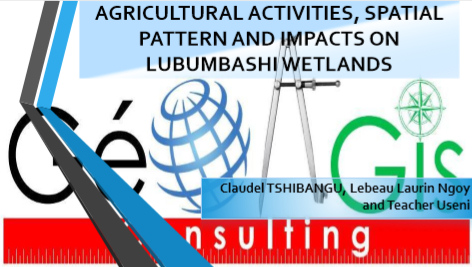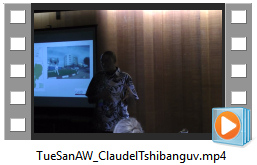- Home
- :
- All Communities
- :
- User Groups
- :
- Conservation GIS
- :
- Documents
- :
- Claudel Tshibangu Lukusa 2019 Conference Talk
- Subscribe to RSS Feed
- Mark as New
- Mark as Read
- Bookmark
- Subscribe
- Printer Friendly Page
Claudel Tshibangu Lukusa 2019 Conference Talk
Claudel Tshibangu Lukusa 2019 Conference Talk
Claudel Tshibangu Lukusa Frankfurt Zoological Society, DR Congo x2019Talk xWetlands xAgriculture xClimate Change
2019 Paper Presentation:
Paper Presentation -pdf 
Video -mp4 HD
ABSTRACT (Session: AGRICULTURE AND WATER MANAGEMENT ): "Agricultural Activities, Spatial Pattern, and Impacts on Lubumbashi Wetlands " Claudel Tshibangu, Frankfurt Zoological Society, DRCongo
Wetlands make cities habitable through the ecosystem services they provide to humanity, from freshwater inputs to food and building materials, biodiversity, flood control, groundwater recharge, and climate change mitigation. Because of the low availability of space in urbanized environments, these areas are subject to the double pressure of urbanization and the development of urban agriculture. Lubumbashi, the capital city of Haut-Katanga province, located in the southeast of the Democratic Republic of the Congo, does not have a master plan of development and also does not escape this trend. For this reason, our study quantified the spatial structure of wetlands and assessed the potential impact of agricultural activities on the Lubumbashi wetlands. GIS approach revealed a complexity in the shape of wetlands. The low median recorded area suggested that a large surface wetland has been reduced in terms of size. The spatial connectivity between the wetlands and other green spaces in the city would be significantly reduced, especially since they are mostly surrounded by houses. Field surveys have shown the potential impact of agricultural activities on wetlands by reducing their size and the risk of dispersal of certain exotic species found on the fields. The wetlands are being invaded by agricultural activities in all the localities the study took place. For example, Katuba locality records itself 1.5 ha of vegetable crops within wetlands. This legume is dominated by exotic species, including Brassica chinensis, which has a high occurrence. Policies to preserve wetlands through zoning, as well as those to restore degraded wetlands, were suggested to decision makers in an effort to contribute to the climate change mitigation.

